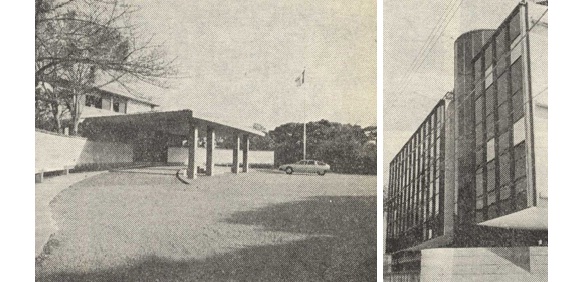by Alex Dean
Wailing for the First Secretary of the French Embassy was a warm experience: sinking down into wonderfully comfortable brown (light, not the usually first-thought-of dark color) leather couch, padded at the arms, broken in well at the back and scat. Really comfortable!
The glass-fronted reception area looks out on a small courtyard. Across the yard is the Consular Office. Sitting in body-melding comfort, there’s time to study in depth one of the raised line reliefs cut into either side of the courtyard entrance.
There are two figures. Appropriately (when one thinks of the French) the male is an artist with his as-yet-uncompleted masterpiece propped up against his knees. His right hand leans across his thighs and the left dangles down near an easel. His head is cocked to the right as he contemplates (admires?) his nude female model (in the grass among the flowers) in front of him. The relief is simply and delicately executed.
Ninety percent of all French citizens living in Japan (approximately 4,000) have passed by it, either noticing the relief or not, when registering at the French Consulate, an unbelievably high percentage since registration is on a voluntary basis. But there are reasons for this high percentage of registration.
Guide Pratique de Tokyo is one of those reasons. Published by the Les Amies de Langue Francaise Association des Francois du Japon and distributed through the Embassy for ¥2,000, this collection of pertinent and interesting information is the most complete available printed in the French language. Any French-reading individual could benefit from it and it’s a book every French citizen living in Japan must have.
The guide covers everything… there are maps, a short lesson in basic Japanese, music and words for the national anthem of Japan, a breakdown of the Imperial family, discussion and government in Japan, a listing of French restaurants, Japanese and French festivals, French organizations and educational opportunities. There’s information on the tax system, tariffs, all the way to medicine and how to send a telegram. There’s a few paragraphs on clubs, discotheques and bars and even a list of sports opportunities and salone de coiffure ei beaute.
Gaining a copy of this publication is good enough reason to visit the French Embassy, but perhaps the real incentive for French citizens to register at the Consulate is the resultant savings in their pocketbooks. When a citizen registers he is issued a Consular Identity Card which provides him a special rate when applying for a new passport or any other document through the Consulate. The card helps in other areas as well.
It’s proof to the local authorities that you are, in fact, under the protection of the French Consul. And when you go abroad or return for a visit to France, it is proof to the French authorities that you are living abroad. And if you buy any consumer goods while back in France, this card (which proves you are living and working abroad) will enable you to have part of the taxes on those goods returned to you.
The Consular Identity Card is issued to French citizens who have a valid visa with six or more months left on it.
Although French tourists are not eligible for this card, they are encouraged to register at the Consulate during their stay in Japan. They can obtain a copy of Guide Pratique de Tokyo and by registering the Embassy has a better chance of assisting them should an emergency situation arise.
The Tokyo Accueil Association is a group that works closely with the Association of French in Japan to assist French citizens arriving in Japan. They are another resource available through registration at the Embassy. “This association has helped quite a lot of French citizens in Japan,” says Henri Samy, Consulate of France. “They’re a helping hand from home.”
Though offering all the same support services available through the U.S. Embassy Consular Section (as discussed at length in the July 3, 1987, Tokyo Weekender) the French Consulate is not a section, but rather a full consulate, independently exercising the full range of consular support for French citizens. Previous to July, 1985, the Tokyo Consulate a section, but at that time two separate consular districts were established in Japan: The Consulate of France, now Henri Samy, Tokyo, and the Consulate General of France in Osaka, now Renee Veyret.
French citizens living in Japan (who have a Consular Identity Card, of course) can actually vote for president or for a referendum right at the Embassy. For assembly member or local elections, French citizens can fill out a special proxy form at the Embassy which enables someone in France to vote for them.
Should a non-French person want to visit France for a period of time longer than three months, you must come to the Consulate. Office hours are 9 a.m. till 12:30 p.m. and 2:30-5 p.m. weekdays. The number of long-stay visas issued is controlled according to each country.
The current site of the French Embassy, in Minami-Azabu around the corner from the New Sanno Hotel, was obtained from the Tokuzawa family in 1933. Prior to that time, the Embassy was located near the Imperial Palace, but the building was destroyed during the 1923 earthquake. Back in those early days the French Ambassador was Paul Claudel, an author as famous for his literary works as for his diplomatic accomplishments. His famous first play Soulier de Satin achieved world-wide recognition. Many of his plays, stories and books were written while he served in Japan and certainly many more were influenced by his Japanese experiences.
The current building was constructed in 1954-57 under the direction of architects Belmont and Fukunaja. French works of art are periodically on display at the Embassy.
External Link:
Ambassade de France au Japon









